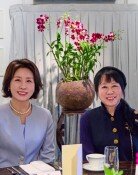[Opinion] 486
A Korean philosopher in the United States made an interesting prediction in the 1990s. He said, The Korean society will suffer from a febrile illness in the future because of the 386 generation. He says he arrived at this conclusion after working as a visiting professor at Seoul National University in the mid 1980s. He said he was particularly disappointed and saw no hopes in the student activists who held firm beliefs in the Juche (self-reliance) ideology, which North Korea insists was established by its former leader Kim Il Sung, for their rigid way of thinking and overly simplified logic. His prediction fell on deaf ears, little suspecting that it was anywhere close to being possible. After a decade, however, his prophecy came true. The problem is that those 386ers, who played the most crucial role in getting the Roh Moo-hyun into office, are now contriving to hold on to their power for 10 to 20 years to come.
The term 386, which describes those in their 30s who were born in the 60s and attended college in the 80s, was coined in the 1990s as a new keyword that depicted the Korean Society. This generation, which experienced the atrocity of the Gwangju incident of 1980, crossed the forbidden line over to Anti-Americanism, a taboo of the time, and some are still mired in the swamp of Juche ideology. They unknowingly developed over-consciousness in the face of the depressing reality of the time, and they persistently refused to change their minds about their beliefs even with the downfall of the Soviet Union and the Eastern Europe.
The opinions about 386 range from one extreme to the other. Some would perceive them favorable as an independent force with great understanding for the weak of the society. Others will call them the Red Guards or the Axis of Evil. Many say they are actually the real power behind the current administration. There is, however, nothing that remains unchanged. The former 386ers who are now in their forties declared the formation of Solidarity 486 of Liberalism after looking back and repenting for their limited and thickheaded past experiences. Their idea is to undergo an evolution in the way of thinking just as the computer processor evolved from 386, 486, and to Pentium (586).
Under the dictatorship, the society was quite tolerant of the student activists. At some points, they were even shielded from criticism as if they were the ones who fought for the nations independence. The activist students had a sense of moral superiority over those who pursued academic achievement. They were the ones who were bragging even as they were being treated for a shot of liquor from their better-off alumnus who got there by working hard. Consequently, these activists were lost in the flow of time and history, always hating and, ironically, taking after the ones in power. The activist students are now abased by their fellow schoolmates as sporting students, as the Korean term for activist is a homonym of sports. As the old saying goes, water that does not flow goes bad.
Oh Myung-chul, Editorial Writer, oscar@donga.com







